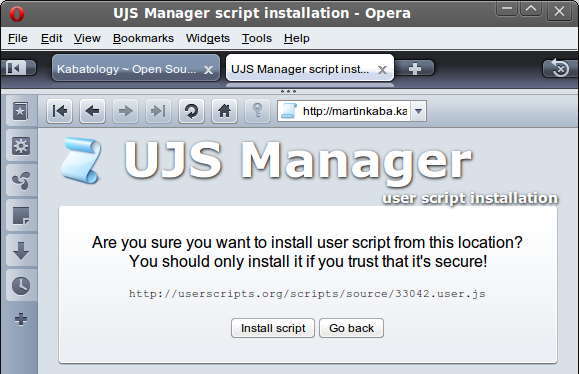Opera-Browser
The Opera development team has released another development snapshot of Opera 10.50 browser for Unix/Linux. Opera “10.5 alpha showcases the latest technologies that will be available in” the “next major release”. This build contains many improvements, bug fixes and several known issues too; font problems, command line option problems, compiz issues, language input issues and many more. More»
Posted in Opera-Browser, Ubuntu, Video | 4 Comments »
Opera developers have released another snapshot of the upcoming Opera 10.5 web browser. In the previous release, Linux builds were absent, this new snapshot marks the return of the penguin. But Mac and Linux versions of Opera 10.5 are much behind in development with respect to the Windows version. Opera intends to roll-out Opera 10.50 final for Windows first, and then set-off to deliver to the other platforms their ‘finals’. More»
Posted in Opera-Browser, Ubuntu, Windows | 3 Comments »

[Screenshot updated]
Two days back I presented an unofficial or “back door” version of Opera 10.50 pre-alpha with “Private tab”.
Today the official version is out with Private Tab/Window browsing confirmed (“you can open a new Private tab or Private window that forgets everything that happened on it once closed”.) but with an overall new User Interface. This pre-alpha is a feature-incomplete and unstable development build for “non-productive” Windows and Mac platforms, a UNIX/Linux version is still to come. More»
Posted in Opera-Browser, Windows | 6 Comments »
Opera 10.50 Pre-Alpha will be officially released on December 22nd but someone let the cat out of the bag before hand and Opera 10.50 is now available for download. More»
Posted in Open-Source, Opera-Browser, Windows | 1 Comment »
For Windows, Mac and Linux: In Adapting Greasemonkey UserScripts for Opera 10 Browser I showed you how to manually install User Scripts in the Opera Browser. You had to create a local folder for your user scripts, then direct Opera to fetch your scripts in it; once a UserScripts is placed in that folder, it is automatically enabled and working, that means the only way to disable a userscript in that folder was to delete it. Installing and managing userscripts was so manual in Opera browser, unlike in Firefox and Chrome/Chromium where you can enable/disable Greasemonkey and its scripts with just a click or two.
With Opera Unite’s (UJS) User Script Manager the Opera Browser is on a par with Firefox and Google Chrome /Chromium – at least when it comes to handling user scripts. UJS Manager for Opera Unite installs User Scripts as extensions, the Chrome-like way. More»
Posted in Opera-Browser, Ubuntu, Windows | 10 Comments »



 [Screenshot updated]
[Screenshot updated]



